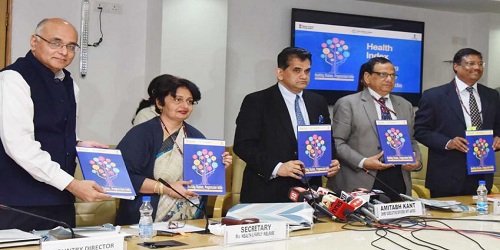On February 9, 2018, NITI Aayog launched the ‘Healthy States, Progressive India’ Report. The report was jointly released by NITI Aayog CEO – Amitabh Kant, Ministry of Health, Secretary – Preeti Sudan and World Bank India Country Director – Junaid Ahmad.
Details about ‘Healthy States, Progressive India Report’:
The report ranks Indian States and Union territories (UTs) on their year-on-year incremental change in health outcomes, as well as, their overall performance with respect to each other.
- In order to ensure fair comparison, rankings have been assigned by placing States and UTs in three categories namely viz. Larger States, Smaller States, and Union Territories (UTs).
- The report has been developed through comprehensive study and has incorporated inputs from World Bank, India and Union Ministry of Health and Family Welfare.
- Rankings are assigned based on assessment of States and UTs on various indicators place under three broad domains viz. Health Outcomes (70% weightage), Governance and Information (12% weightage); and Key Inputs and Processes (18% weightage).
Highlights of ‘Healthy States, Progressive India Report’:
In terms of overall performance, Kerala, Punjab and Tamil Nadu have emerged as best performers among larger states.
- Highest annual incremental performance (among larger states) has been exhibited by Jharkhand, Jammu and Kashmir and Uttar Pradesh.
- In terms of overall performance among smaller states, Mizoram has ranked first. Mizoram is followed by Manipur.
- Among smaller states, highest annual incremental performance was exhibited by Manipur and Goa.
- Among Union Territories, Lakshadweep has topped in overall performance as well as in highest annual incremental performance.
- The report has outlined that about one-third of the States have registered a decline in their overall performance in 2016 as compared to 2015.
- Vacancies in key staff, quality accreditation of public health facilities and institutionalization of Human Resources Management Information System (HRMIS) and establishment of functional district Cardiac Care Units (CCUs) have been identified as common challenges prevalent in most States and UTs.
- Besides, it has been recommended that all Larger States need to focus on improving the Sex Ratio at Birth (SRB).
AffairsCloud Recommends Oliveboard Mock Test
AffairsCloud Ebook - Support Us to Grow
Govt Jobs by Category
Bank Jobs Notification



